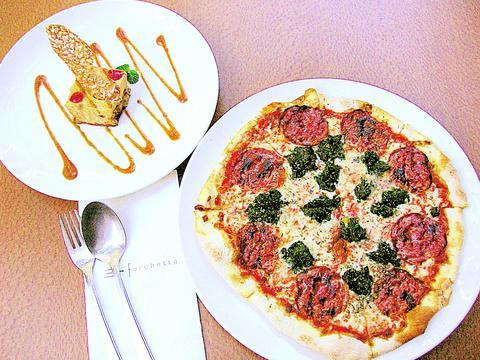Over the past six months, Max Tseng (
A veteran of the kitchens of Haoyang (

PHOTO: GAVIN PHIPPS, TAIPEI TIMES
And with the summer weather settling in, the simple and well-ventilated dinning area is a real treat. Max's design includes a huge glass facade, which, when fully open, gives the already spacious joint an even greater sense of space.
The dining environment is a major draw, but the food certainly cannot be ignored. A combination of Italian and Spanish with a bit of French, the dishes on the menu might not be as numerous as other European-styled joints, but for presentation and taste, Forchetta outclasses many, if not all, its rivals.
Forchetta's range of tapas include Spanish-style bread (NT$100), asparagus wrapped with Parma ham and Dijon pommary (NT$150), and roasted foie gras with fig sauce (NT$380). While a bit costlier than the average starter, Forchetta's Bufalo mozzarella with tomatoes (NT$360) is well worth the extra cost, especially when you consider that Max imports the cheese especially for this dish.
At present, Forchetta's pasta dishes are somewhat limited, with most of the half-dozen choices topped with seafood. These include linguini with crab and mushroom sauce (NT$260), penne with anchovies and olives (NT$260) and linguini with clam and white wine sauce (NT$260). According to Max, the pasta menu is set to change some time in the coming weeks when he plans to add new dishes to the pasta menu.
While the tapas and pasta dishes are faultless, it's Max's mouth-watering pizzas that have tongues wagging. The secret to Max's pizza is the crust. Not greasy, not soggy, and certainly not chewy.
Forchetta's pizza combinations include the absolutely fantastic spinach, salami, gorgonzola and mozzarella (NT$380) and the equally tasty, yet saucily spicy sausage, mushroom and mozzarella (NT$320). For cheese lovers, the gorgonzola, brie, ricotta and mozzarella (NT$380) comes highly recommended.
For those out to wine as well as dine, Forchetta offers a variety of both Old and New World wines, all of which are reasonably priced at between NT$700 and NT$1,500 as well as a good choice of bottled European beers at NT$170 a pop.

Towering high above Taiwan’s capital city at 508 meters, Taipei 101 dominates the skyline. The earthquake-proof skyscraper of steel and glass has captured the imagination of professional rock climber Alex Honnold for more than a decade. Tomorrow morning, he will climb it in his signature free solo style — without ropes or protective equipment. And Netflix will broadcast it — live. The event’s announcement has drawn both excitement and trepidation, as well as some concerns over the ethical implications of attempting such a high-risk endeavor on live broadcast. Many have questioned Honnold’s desire to continues his free-solo climbs now that he’s a

Lines between cop and criminal get murky in Joe Carnahan’s The Rip, a crime thriller set across one foggy Miami night, starring Matt Damon and Ben Affleck. Damon and Affleck, of course, are so closely associated with Boston — most recently they produced the 2024 heist movie The Instigators there — that a detour to South Florida puts them, a little awkwardly, in an entirely different movie landscape. This is Miami Vice territory or Elmore Leonard Land, not Southie or The Town. In The Rip, they play Miami narcotics officers who come upon a cartel stash house that Lt. Dane Dumars (Damon)

Francis William White, an Englishman who late in the 1860s served as Commissioner of the Imperial Customs Service in Tainan, published the tale of a jaunt he took one winter in 1868: A visit to the interior of south Formosa (1870). White’s journey took him into the mountains, where he mused on the difficult terrain and the ease with which his little group could be ambushed in the crags and dense vegetation. At one point he stays at the house of a local near a stream on the border of indigenous territory: “Their matchlocks, which were kept in excellent order,

Today Taiwanese accept as legitimate government control of many aspects of land use. That legitimacy hides in plain sight the way the system of authoritarian land grabs that favored big firms in the developmentalist era has given way to a government land grab system that favors big developers in the modern democratic era. Articles 142 and 143 of the Republic of China (ROC) Constitution form the basis of that control. They incorporate the thinking of Sun Yat-sen (孫逸仙) in considering the problems of land in China. Article 143 states: “All land within the territory of the Republic of China shall